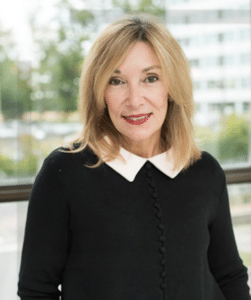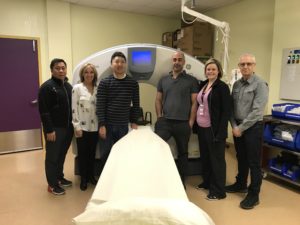Dr. Carole Dennie, cardiothoracic radiologist in Ottawa, is a Fellow of the CAR and President of the Canadian Society of Thoracic Radiology (CSTR). Her passion is teaching and providing access to continuous learning opportunities to enable the delivery of high-quality service throughout a radiologist’s work lifecycle. Her recent trips to Iqaluit have helped to make medical imaging equipment accessible in remote communities and illustrate that change is possible through active listening.

Dr. Dennie is a Professor of Radiology at the University of Ottawa. She is Head of the Cardiac and Thoracic Imaging Sections at the Ottawa Hospital and Co-director of Cardiac Radiology and MRI at the University of Ottawa Heart Institute. She is the President of the CSTR and Treasurer of the North American Society for Cardiovascular Imaging (NASCI). She is the immediate past Chair of the Comprehensive Objective Examination Board at the Royal College of Physicians and Surgeons of Canada and is a fellow of the CAR, NASCI and Society of Cardiovascular CT (SCCT).
She enjoys research and has published close to 120 peer-reviewed manuscripts, eight (8) book chapters and sits on the editorial board for the Radiology: Cardiothoracic Imaging journal. She has delivered close to 150 invited lectures on the national and international stage, directed multiple national and international conferences and was the 2019 recipient of the University of Ottawa Faculty of Medicine Award for Excellence in Continuing Professional Development.
Over the past five years, Dr. Dennie has focused her attention on lung cancer screening as the Champlain region Radiology Quality Lead for the Ontario High Risk Lung Cancer Screening pilot. She is honoured to Chair the CAR/CSTR Lung Cancer Screening Education Working Group and participate on the CAR/CSTR Lung Cancer Screening Accreditation Working Group.
As a French Canadian, fourth generation Métis, born and raised in a small village outside Sudbury, Ontario, Dr. Dennie is well aware of the invisible barriers and struggles that face people with diverse backgrounds and upbringings who aspire to practice and become leaders in the medical field. Early outreach is key to promoting diversity and inclusion. Dr. Dennie recalls being a medical student and returning to her own high school to meet with students and encourage them to pursue higher education.
“I think it’s important to live and breathe these values and reflect these to those around us. As individual radiologists, we not only have to lead the change but embrace it.”

More recently Dr. Dennie spent time travelling to Iqaluit to develop a cardiac CT program. Roughly 75 patients from Nunavut were being referred to the Ottawa Hospital on an annual basis for cardiac investigations. Not only is this costly, but patients were also receiving more invasive tests to expedite results. Dr. Dennie made a case to the Medical Advisory Committee to upgrade the equipment available in Iqaluit and to eliminate the need for travel. After a full year of work to obtain government approval, they managed to install the hardware on their CT scanner and train technologists. The community now performs 10 cardiac CT scans per month onsite.
“The concept of making individual changes doesn’t only apply to our colleagues and trainees but also to the people within our teams and to our patients. It’s how we relate to them regardless of appearance, likes or dislikes, visible race or gender identity, religion, nationality, body size, disability, age, or sexual orientation. Every individual radiologist can work on that on a daily basis. Within our own practices, we have to make everyone feel valued and to do that, we have to learn to listen so we can understand the needs. This could translate into new or updated policies and processes, as well as adaptations to the physical space. It’s not about treating people equally, it’s about focusing on the needs of each individual. We can all contribute to removing barriers to help elevate those who may not have the opportunity otherwise and give them a level playing field. Certainly, this is what I try to do every single day, one person at a time,” says Dr. Dennie.
Dr. Dennie applauds the CAR for establishing the Equity, Diversity, and Inclusion (EDI) Working Group and its support for Canadian Radiology Women.
